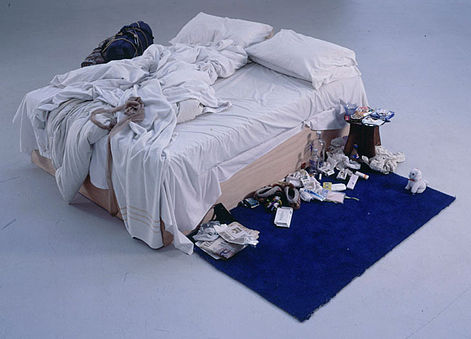
You may have come into contact at some point with Tracey Emin’s My Bed, an art installation that reproduces her private space during a time when she spent four days as a shut-in in 1998, “heartbroken”: the bed’s unmade, the bedside strewn with cigarettes, moccasins, a bottle of booze, food, and “what appears to be a sixteen year old condom”…. If you were savvy enough to be Tracey Emin in 1998—and none of us were—you would have sold that messy room for over four million dollars last year at a Christie’s auction. I doubt another buyer of that caliber will come along for a knock-off, but this doesn’t mean the messes we make while slobbing around our own homes are without their own, intangible, value.
Those messes, in fact, may be seedbeds of creativity, confirming a cliché as persistent as the one about doctors’ handwriting, and perhaps as accurate. It seems a messy desk, room, or studio may genuinely be a mark of genius at work. Albert Einstein for example, writes Elite Daily, had a desk that “looked like a spiteful ex-girlfriend had a mission to destroy his workspace.” Einstein responded to criticism of his work habits by asking, “If a cluttered desk is a sign of a cluttered mind, then what are we to think of an empty desk?”
Mark Twain also had a messy desk, “perhaps even more cluttered than that of Albert Einstein.” To find out whether the messiness trait’s relation to creativity is simply an “urban legend” or not, Kathleen Vohs (a researcher at the University of Minnesota’s Carlson School of Management) and her colleagues conducted a series of experiments in both tidy and unruly spaces with 188 adults given tasks to choose from.
Vohs describes her findings in the New York Times, concluding that messiness and creativity are at least very strongly correlated, and that “while cleaning up certainly has its benefits, clean spaces might be too conventional to let inspiration flow.” But there are trade-offs. Read about them in Vohs’ paper—“Physical Order Produces Healthy Choices, Generosity, and Conventionality, Whereas Disorder Produces Creativity.” And just above, see Vohs’ co-author Joe Redden, Assistant Professor of Marketing at the University of Minnesota’s Carlson School of Management, discuss the team’s fascinating results. If conducting such an experiment on yourself, it might be best to do so in a space that’s all your own, though, like the rest of us, you’re too late to creatively turn the mess you make into lucrative conceptual art.
Related Content:
Why You Do Your Best Thinking In The Shower: Creativity & the “Incubation Period”
John Cleese’s Philosophy of Creativity: Creating Oases for Childlike Play
Josh Jones is a writer and musician based in Durham, NC. Follow him at @jdmagness


We all know this, except Emin’s mess happens to be really boring, plus it ought to be in the bed, not beside it, and not in seedy little piles. Amateur.
Hi Dan,
I saw this article via mental_floss on Facebook.
I could not have said it better. Xtras for ‘seedy’
re: ‘If you were savvy enough to be Tracey Emin in 1998—and none of us were—you would have sold that messy room for over four million dollars last year at a Christie’s auction.’ I think you will find that Emin did not collect that windfall, just like Peter Doig did not collect $11.3 million for White Canoe when it sold in 2007. It left his studio for around $1500 some years before. I wonder how messy Charles Saatchi’s desk is? But then again I do wonder as to the state of Jeff Koon’s desk or indeed Damien Hirst’s.… I recon tidy and very messy respectively… but that’s just a gut feeling…
messiness or different order?
I mess my world for ny own disadvantage , eduardo
IMHO, it’s a manifestation of ADHD. Commenting for a friend.
I personally don’t like cleaning my work spaces because then I can’t find anything! And when my desk or table is neat, I get hung up on keeping it neat instead of just doing whatever I sat down to do.
My messes are usually organized, and let me let go of keeping things neat and tidy and looking good for whoever might be going by. I can focus on doing what I’m doing, not the condition of my desk.
Drives my husband batty when I work on something. I don’t know how I make a mess, but I do, even if I’m just writing (working on my book series leads to the dining table being covered in books, papers, various cats and writing utensils, and food). He’s the same way, so I don’t pay him any attention. He scatters things to the four winds just as much as I do.
Besides, there’s something cozy about a messy work space. It actually feels like someone works there, someone that’s a real human being full of chaos and activity. Clean just feels…clean. Uncomfortable. How can you work here and enjoy yourself while keeping everything so neat and proper? So much energy spent on that. (I understand some hobbies and professions demand cleanliness to certain degrees, and I can’t argue with that.)
I’ll take a OCD person over a slob any time. Yeah there might be a few messy geniuses—but most are just disorganized human beings in everything from their work to their personal habits.